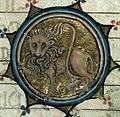Reginald of Bar (bishop of Metz)
Reginald of Bar (Renaud de Bar) was bishop of Metz from 1302 to 1313. He was the son of Thiébaut II, count of Bar and his wife Jeanne de Toucy, and the grandson of Henry II of Bar.
He was made canon at Rheims, Laon, Verdun and Cambrai and then, before 1298, archdeacon of Brussels. He then became archdeacon of Besançon in 1299 before being made canon and 'princier' of Metz in 1301 and provost of la Madeleine in Verdun in 1302. In mid-1302, he was elected bishop of Metz, but the election was considered irregular since the pope held the privilege of name the holder of this bishopric. To solve the problem, appease the clergy at Metz, and save face, Pope Boniface VIII vetoed the election but then immediately named Reginald as his choice for the bishopric. He was the only prelate from the archdiocese of Trier to assist at the council of Vienne, called by pope Clement V to suppress the Templars. Reginald fought against Theobald II, Duke of Lorraine, then against the magistrates of Metz. He was forced to retire in the messine campaign and died on 4 May 1316, apparently poisoned.
Liturgical Manuscripts
Reginald de Bar is known to have owned six liturgical manuscripts all dating from the fourteenth century, probably between 1302 and 1305.[1] The manuscripts were probably gifts from his relations, including his sister, Marguerite de Bar, abbess of the Abbey of Saint-Maur de Verdun[2] and his mother, Jeanne de Toucy, whose arms figures many times in the margins alongside those of her son. All six manuscripts are designed to be used in church ceremonies by a bishop.
- Breviary for the Use of Verdun – Summer volume Base Enluminures (BM Verdun ms. 107)
- Breviary for the Use of Verdun – Winter volume (British Library, Yates Thompson ms. 8)
- Missal for the Use of Verdun, revised for Metz (BM Verdun ms. 98)
- Pontifical for the Use of Metz – Part 1 (Fitzwilliam Museum Cambridge, ms. 298)
- Pontifical for the Use of Metz – Part 2 (Prague, Bibliothèque nationale, ms. XXIIIC 120), 137 f.
- Ritual for the Use of Metz (BM Metz ms. 43), destroyed in 1944
These manuscripts, especially the two volume Breviary of Verdun, are renowned for their rich illuminations, blason, marginalia and historiated initials.
 Lion, from July, Breviary of Verdun, Winter, British Library
Lion, from July, Breviary of Verdun, Winter, British Library Marginalia, Breviary of Verdun, Summer, BM. Verdun
Marginalia, Breviary of Verdun, Summer, BM. Verdun Combatants carrying their heads, Breviary of Verdun, Summer
Combatants carrying their heads, Breviary of Verdun, Summer
Notes and References
Georges Poull, La Maison souveraine et ducale de Bar, 1994.
References
External links
- Renaud de Bar sur Saarländische Biografien
- Missel et bréviaire de Renaud de Bar sur le site de la bibliothèque de la Codecom de Verdun